Essential Catering Equipment for Startups
Aside from the hoops and loops of putting together a catering business, there is another big challenge for you: choosing your commercial kitchen equipment.
You Need Equipment, a Handful of Them.
When it comes to running a catering business in New Zealand, the checklist of items you need could be endless. You might even need more if you are serving bigger events. This could include smaller food preparation tools such as pans and knives as well as bigger equipment like refrigeration units and gas ranges.
The right equipment will help you prepare and serve foods faster and more efficiently.
The most common dilemma for start-ups.
Choosing kitchen equipment and appliances could be daunting especially if you’re new to the industry. You may be wondering:
- Which commercial kitchen equipment to choose?
- Should I opt for brand new appliances, rent or buy second-hand?
- Where to get the best-priced equipment to match the budget?
Hygiene and Sanitation Rules Affect Your Equipment Checklist
The sanitary side of the business affects the type of equipment you’ll acquire. You need to make sure that your kitchen tools meet health and safety regulations. Your business is responsible for making sure that maintenance, sanitisation, and checkups are done in accordance with the laws otherwise there is the risk of fines, or worse, business closure.
Since hygiene and sanitation are important for compliance, you have to take into consideration that your chosen equipment is easy to clean, troubleshoot and maintain. Their parts should be readily available in case of emergency. It is crucial that most of your staff knows how to use, clean and maintain your equipment.
Assess Your Busiest Catering Day
When looking for an ideal piece of equipment, you can start by assessing what your busiest event day might look like. From there, calculate how much volume of food your kitchen needs to process.
- What are the menus?
- How many foods do you need to process?
- Which equipment is capable of meeting those demands?
- What are the smaller appliances essential to operating such a busy day?
By answering these questions, you can roughly base your ideal equipment’s capacity, size, and features.
Once you have assessed your business needs and identified the equipment that will best meet those needs, you may want to consider additional equipment, such as chest freezers. FED offers a range of chest freezers in different sizes and capacities to help businesses store and preserve frozen foods. With the right equipment, your business can operate more efficiently and effectively, even on your busiest days.
Importance of Using Catering Equipment
So let’s take a step back. Why should you opt for commercial catering equipment?
If you’re running a small business with about less than twenty daily patrons, you may be able to get away with using domestic equipment. But, for a catering business that serves a handful of guests, proper equipment is a must.
You might be tempted to opt for domestic appliances since they’re significantly cheaper and easier to acquire. This is a mistake. These appliances are not built for rigorous and repetitive use. They are also not insured for commercial use. Buying these for business use can lead to a more dramatic expense. Right from the get-go, it is absolutely necessary to choose commercial kitchen appliances if you’re running a catering business.
From the stage of preparation up to serving, you need reliable equipment that can withstand busy demands.
Food Preparation Equipment
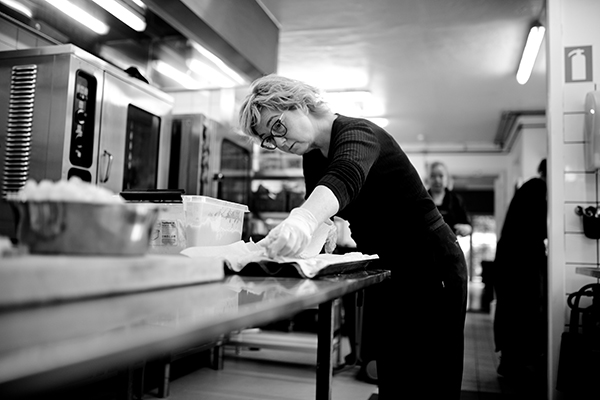

You need commercial kitchen equipment and professional tools to make magic happen in the kitchen. This includes refrigeration units, ovens, fryers, ranges, mixers, packaging machines and so on. For this part of your catering business, the types of equipment you’ll pick will be based on your menu, space availability and budget.
When shopping for commercial kitchen equipment, it is strategic to tag along the staff or chefs who will be using this equipment. After all, they know what’s best for their work. For instance, when it comes to chef’s knives, your chef knows his best option based on hand feel and blade quality.
- Scales
- Blenders
- Openers
- Processors
- Mixers
- Slicers
- Cutters
- Mincers
- Chippers
- Peelers
- Dehydrators
- G/N pans
Off-site Equipment
Your off-site equipment is the tools you’ll use for transporting, storing and serving foods.
If the usual routine is prepping foods in the kitchen and serving them in a different location, you definitely need a chafer to keep foods warm. Chafers and chafing dishes are available in different styles, shapes and specifications.
Warming carts are also essential to keep foods at proper serving temperatures during and after transport. Go for warming carts that have castored wheels so you can move them with ease to different parts of the venue.
If the job calls for cooking away from your central kitchen, then you need tabletop burners, hot plates or induction ranges. If the menus call for it, you may also need portable smokers or grills. Some off-site equipment you may need:
- Catering vehicle
- Insulated food carriers
- Countertop induction cookers
- Chafing dishes
- Chafers
- Tables
- Chairs
- Tablecloths
- Glass racks
- Insulated beverage dispensers
- Offsite cooking equipment
Table Setting and Dining Essentials
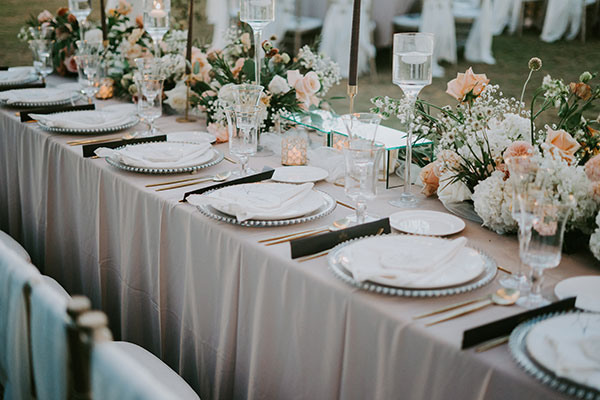

Tables have to be presentable. Essentials like soup bowls, plates, utensils and glassware must be properly arranged. Say you’re also serving coffee, tea and other hot beverages, in this case, you will require equipment to keep your drinks at the best temperature. For hot beverages, percolators and hot drink urns are the best options. Mugs and cups should also be ready. Serving equipment like pitchers, trays and tubs are also essential for proper table setting.
- Soup bowls
- Plates
- Utensils
- Glassware
- Mugs
- Cups
- Trays
- Pitchers
- Tubs
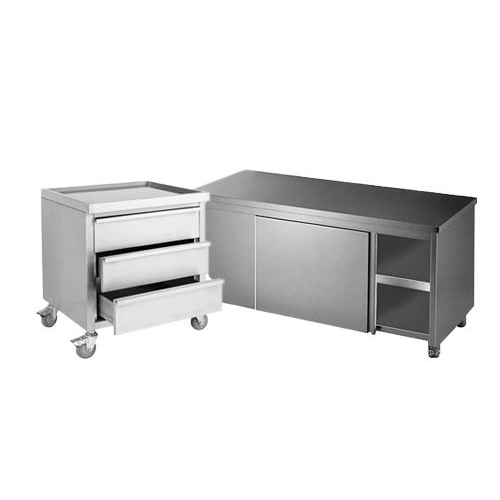

Storage Equipment
Storage equipment is very important for a catering business. You need to keep the items at their proper temperature, make sure they won’t spoil and they’re presentable for the event.
You have to invest in off-premise storage equipment. These include insulated food storage for cold and hot staging, foil pans, coolers and disposable bags.
- Insulated food storage
- Tray stands
- Coolers
- Disposal bags
In addition to off-premise storage equipment, a bain marie can also be a valuable piece of equipment for a catering business, as it can help keep food warm and ready for service, while also providing an attractive display for guests.
Choosing Your Catering Equipment
Business owners often have 4 deciding factors when it comes to catering equipment: energy efficiency, quality, ease of use and cost.
Energy Efficiency
When it comes to kitchen equipment for catering, many appliances are highly energy-intensive. This is because commercial kitchen equipment uses twice as much energy compared to domestic appliances. Luckily, modern kitchen appliances now have energy-efficient options to help reduce energy consumption and carbon footprint. If you are using energy-efficient equipment, you can save as much as 25% on annual energy consumption.
Quality
Catering is without a doubt a very busy kind of food-serving business. Given that, it is essential that you choose equipment that can withstand rigorous use in high-traffic settings. Go for the most trusted brands of commercial kitchen equipment. Visit showrooms for demos and testing so you can compare your prospective equipment.
In commercial settings such as in a catering business, stainless steel appliances are often the first choice of business owners. Stainless steel is durable and easy to clean. Bigger equipment that is built with stainless steel often lasts between a decade or two which makes them worthy investments.
Ease of Use
Given how much time is spent on food preparation and serving, it only makes sense to choose kitchen equipment that is easy to use and maintain. Consider ergonomics and storage options as well. Your equipment’s sanitisation and hygiene should be something that most of your staff can handle.
Cost
There’s the most obvious: cost. There’s no one-size-fits-all cost estimate for a catering equipment budget. There are many variables to consider. The budget could range between $40,000 and $200,000. If you’re using software equipment such as a CMS for your POS, some may need monthly license fees.
We Make it Easy for You to Acquire Catering Equipment in NZ
Start your catering business with FED.
We offer cooking equipment, food preparation supplies, hot food display appliances, beverage equipment, commercial dishwashers, and storage equipment for catering businesses.
With decades of experience working with catering and restaurant business owners in New Zealand, we understand that every business has its own unique requirements. We’ll walk you through options so you can get the best equipment that suits your budget. Our equipment are functional, reliable and equipped with features essential to running a successful catering business.
We have also partnered with one of New Zealand’s most trusted funding solutions — Silver Chef. Silver Chef offers a Rent-Try-Buy scheme for catering businesses that want to lower their startup risk.
Call us at AU 1300 659 409 / NZ 09 415 6470 and one of our team members will be happy to assist you.
Commercial kitchen equipment offered by FED
- Cooking equipment
- Beverage equipment
- Food prep equipment
- Hot food display
- Servery equipment
- Commercial dishwashers
- Kitchenware
- Storage
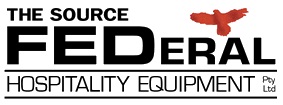
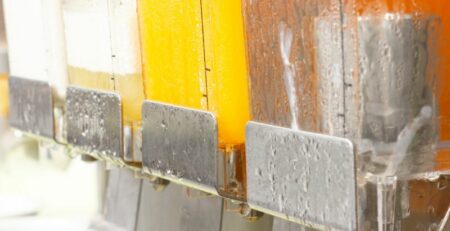
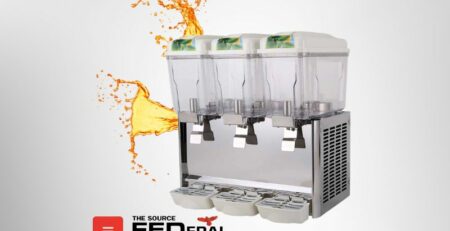
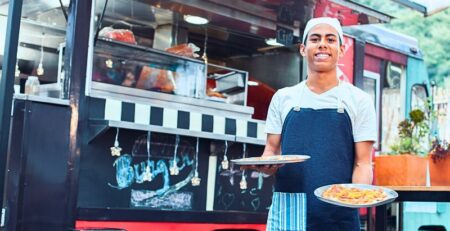
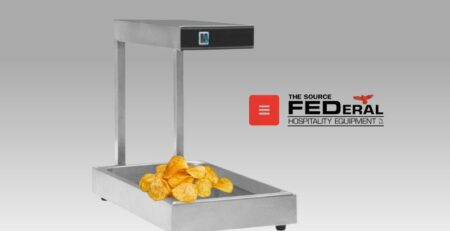
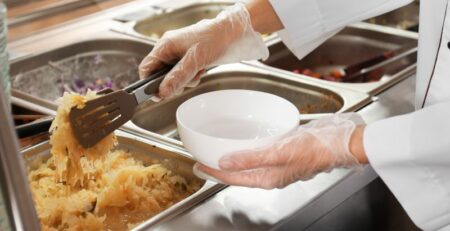
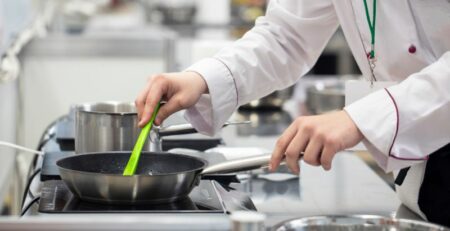

Leave a Reply